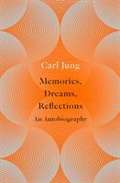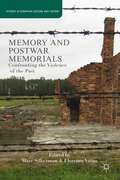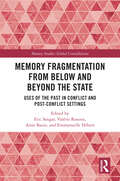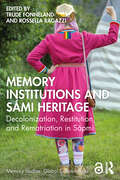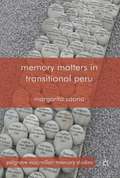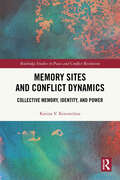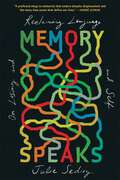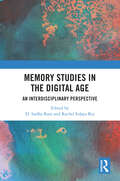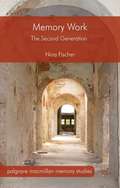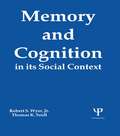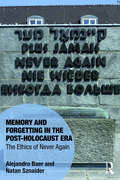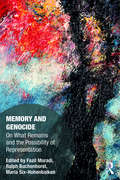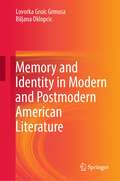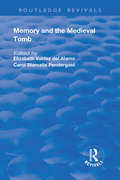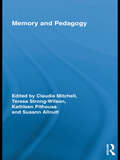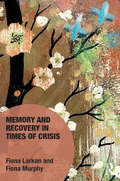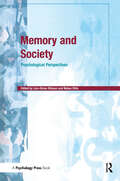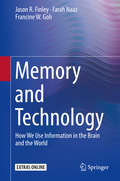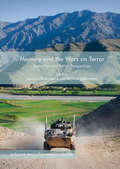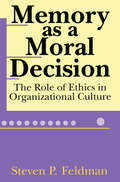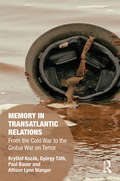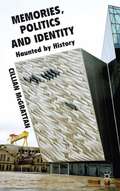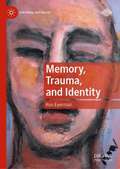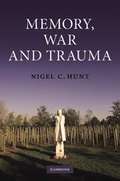- Table View
- List View
Memories, Dreams, Reflections: An Autobiography
by Carl JungFour years before his death, Carl Gustav Jung, psychiatrist and psychologist, began writing his life story. But what started as an exercise in autobiography soon morphed into an altogether more profound undertaking. The result is an absorbing piece of self-analysis; a frank statement of faith, philosophy and principles from one of the great explorers of the human mind. Covering everything from Sigmund Freud, analytical psychology and Jungian dream interpretation to a forthright discussion of world myths and religions, including Christianity, Buddhism, and other faiths, Memories, Dreams, Reflections is a remarkable book showing a man of great depth, humility and perspicacity. Once read it is never forgotten.
Memory And Postwar Memorials
by Marc Silberman Florence VatanThe twentieth century witnessed genocides, ethnic cleansing, forced population expulsions, shifting borders, and other disruptions on an unprecedented scale. This book examines the work of memory and the ethics of healing in post authoritarian societies that have experienced state-perpetrated violence.
Memory Fragmentation from Below and Beyond the State: Uses of the Past in Conflict and Post-Conflict Settings (Memory Studies: Global Constellations)
by Eric Sangar, Valérie Rosoux, Anne Bazin, and Emmanuelle HébertThis volume suggests a model of collective memory that distinguishes between two conceptual logics of memory fragmentation: vertical fragmentation and horizontal fragmentation. It offers a series of case studies of conflict and post-conflict collective memory, shedding light on the ways various actors participate in the production, dissemination, and contestation of memory discourses. With attention to the characteristics of both vertical and horizontal memory fragmentation, the book addresses the plurality of diverging, and often conflicting, memory discourses that are produced within the public sphere of a given community. It analyzes the juxtaposition, tensions, and interactions between narratives produced beyond or below the central state, often transcending national boundaries. The book is structured according to the type of actors involved in a memory fragmentation process. It explores how states have been trying to produce and impose memory discourses on civil societies, sometimes even against the experiences of their own citizens, and how such efforts as well as backlash from actors below and beyond the state have led to horizontal and vertical memory fragmentation. Furthermore, it considers the attempts by states’ representatives to reassert control of national memory discourses and the subsequent resistances they face. As such, this volume will appeal to sociology and political science scholars interested in memory studies in post-conflict societies.
Memory Institutions and Sámi Heritage: Decolonization, Restitution, and Rematriation in Sápmi (Memory Studies: Global Constellations)
by Trude Fonneland Rossella RagazziWith a focus on Sápmi – the transcultural and transnational homeland of the Sámi people – this book presents case studies and theoretical frameworks which explore the ways in which memory institutions such as museums, archives, and festivals participate in and guide processes of appropriation, decolonization, and memory-making.The destruction and concealment of Sámi objects in both private and museum collections worldwide have impacted Sámi knowledge systems, disrupting local ways of knowing. Appreciation and reappropriation are important acts of decolonization which seek to create openings for reconnection to traditions, languages, and practices that were forcibly suppressed in the past. Western memory institutions such as museums, archives, and galleries have had a great impact on how heritage has been collected, stored, conserved, and organized within closed walls and glass cases. As the new museology movement developed in the 1990s, numerous examples revealed how difficult it became for researchers and public alike to access heritage. Considering the proliferation of cultural interventions and the growth of Sámi mobilization, which calls into question assumptions about how best to activate and experience Sámi cultural heritage and what constitutes appropriate stewardship, this book sheds light on initiatives to return artefacts to the Sámi community. With particular attention to the ways in which Sámi self-determination and the shifting boundaries between Indigenous and settler identities are articulated, challenged, and renegotiated, it draws on approaches from critical museology and Indigenous methodologies to explore the initiation, experience, and operationalizing of restitution projects.This book will therefore appeal to scholars of cultural studies, anthropology, sociology, and museum and heritage studies, as well as to those interested in questions of repatriation, restitution, and healing processes.
Memory Matters in Transitional Peru
by Margarita SaonaCommemorating traumatic events means attempting to activate collective memory. By examining images, metonymic invocations, built environments and digital outreach interventions, this book establishes some of the cognitive and emotional responses that make us incorporate the past suffering of others as a painful legacy of our own.
Memory Sites and Conflict Dynamics: Collective Memory, Identity, and Power (Routledge Studies in Peace and Conflict Resolution)
by Karina V. KorostelinaThis book explores the ways in which memory sites contribute to the dynamics of identity-based conflicts, fueling fears and sharpening divisions, or promoting commonalities and reducing violence.Through an analysis of the dynamics of identity-based conflicts, the book shows how memory sites become intertwined with the transformations of social boundaries and perceptions of relative deprivation, outgroup threat, collective axiology, and power relations. It posits that these two sets of factors – the functioning of collective memory as an ideological construct and the transformation of conflictual social relations – define the role and influence of memory sites in the dynamics of identity-based conflicts. Through multiple case studies representing different dynamics – dealing with fascist and communist pasts in Italy, post-colonial relations between South Korea and Japan, ethnic conflict in Kosovo, and tribal acknowledgment for Native American Nations – the book discusses how memory sites contribute to competition over ownership, fights for legitimacy, claims of entitlements, and negative portrayals of the Other. In doing so, it outlines four major functions of memory sites – enhancing, ascribing, interacting, and legitimizing – and shows how they contribute to and shape the structure and dynamics of conflict. Concentrating on the linkages between memory sites, violence prevention, and reconciliation, the book proposes solutions for promoting peace, including the focus on plurality of heritage, recognition of fluidity of meanings, and resistance to singular interpretations and manipulations by identity entrepreneurs. This volume will be of much interest to students of peace and conflict studies, memory studies, and International Relations in general.
Memory Speaks: On Losing and Reclaiming Language and Self
by Julie SedivyFrom an award-winning writer and linguist, a scientific and personal meditation on the phenomenon of language loss and the possibility of renewal. As a child Julie Sedivy left Czechoslovakia for Canada, and English soon took over her life. By early adulthood she spoke Czech rarely and badly, and when her father died unexpectedly, she lost not only a beloved parent but also her firmest point of connection to her native language. As Sedivy realized, more is at stake here than the loss of language: there is also the loss of identity. Language is an important part of adaptation to a new culture, and immigrants everywhere face pressure to assimilate. Recognizing this tension, Sedivy set out to understand the science of language loss and the potential for renewal. In Memory Speaks, she takes on the psychological and social world of multilingualism, exploring the human brain’s capacity to learn—and forget—languages at various stages of life. But while studies of multilingual experience provide resources for the teaching and preservation of languages, Sedivy finds that the challenges facing multilingual people are largely political. Countering the widespread view that linguistic pluralism splinters loyalties and communities, Sedivy argues that the struggle to remain connected to an ancestral language and culture is a site of common ground, as people from all backgrounds can recognize the crucial role of language in forming a sense of self. Distinctive and timely, Memory Speaks combines a rich body of psychological research with a moving story at once personal and universally resonant. As citizens debate the merits of bilingual education, as the world’s less dominant languages are driven to extinction, and as many people confront the pain of language loss, this is badly needed wisdom.
Memory Studies in the Digital Age: An Interdisciplinary Perspective
by D. Sudha Rani and Rachel Irdaya RajThis interdisciplinary volume attempts to gauge the individual and social issues related to memory, with an understanding of memory studies as an independent body of scholarship. It draws on multiple fields of knowledge, like popular culture, history, literature, oral cultures, and storytelling, which facilitates a panoramic view of memory studies.This book investigates the intersection between memory studies, partition, oral literature, and digital technology. It is also informed by the consciousness of memory in the digital age, which plays an integral role in what is remembered/forgotten, the form in which such memories are stored, and how they might be retrieved in future.This book will be an invaluable resource for those involved in research from undergraduate to post-doctoral level. This includes sociologists, psychologists, historians, artists, academicians, as well as research scholars from other disciplines.
Memory Work: The Second Generation (Palgrave Macmillan Memory Studies)
by Nina FischerMemory Work studies how Jewish children of Holocaust survivors from the English-speaking diaspora explore the past in literary texts. By identifying areas where memory manifests - Objects, Names, Bodies, Food, Passover, 9/11 it shows how the Second Generation engage with the pre-Holocaust family and their parents' survival.
Memory and Cognition in Its Social Context
by Robert S. Wyer, Jr. Thomas K. SrullThe first comprehensive theoretical formulation of the way people use information they receive about their social environments to make judgments and behavioral decisions, this volume focuses on the cognitive processes that underlie the use of social information. These include initial interpretation, the representations used to make inferences, and the transformation of these subjective inferences into overt judgment and behavior. In addition, it specifies the role of affect and emotion in information processing, and the role of self-knowledge at different stages of processing. The theoretical model presented here is the first to provide a conceptual integration of existing theory and research in all phases of social information processing. It not only accounts for the major portion of existing research findings, but permits several hypotheses to be generated concerning phenomena that have not yet been empirically investigated. Although focused here on the processing of information about people and events, the formulation proposed has implications for other domains such as personnel appraisal, political decision making, and consumer behavior.
Memory and Forgetting in the Post-Holocaust Era: The Ethics of Never Again (Memory Studies: Global Constellations)
by Natan Sznaider Alejandro BaerTo forget after Auschwitz is considered barbaric. Baer and Sznaider question this assumption not only in regard to the Holocaust but to other political crimes as well. The duties of memory surrounding the Holocaust have spread around the globe and interacted with other narratives of victimization that demand equal treatment. Are there crimes that must be forgotten and others that should be remembered? In this book the authors examine the effects of a globalized Holocaust culture on the ways in which individuals and groups understand the moral and political significance of their respective histories of extreme political violence. Do such transnational memories facilitate or hamper the task of coming to terms with and overcoming divisive pasts? Taking Argentina, Spain and a number of sites in post-communist Europe as test cases, this book illustrates the transformation from a nationally oriented ethics to a trans-national one. The authors look at media, scholarly discourse, NGOs dealing with human rights and memory, museums and memorial sites, and examine how a new generation of memory activists revisits the past to construct a new future. Baer and Sznaider follow these attempts to manoeuvre between the duties of remembrance and the benefits of forgetting. This, the authors argue, is the "ethics of Never Again."
Memory and Genocide: On What Remains and the Possibility of Representation (Memory Studies: Global Constellations)
by Fazil Moradi Ralph Buchenhorst Maria Six-HohenbalkenThis book focuses on the ethical, aesthetic, and scholarly dimensions of how genocide-related works of art, documentary films, poetry and performance, museums and monuments, music, dance, image, law, memory narratives, spiritual bonds, and ruins are translated and take place as translations of acts of genocide. It shows how genocide-related modes of representation are acts of translation which displace and produce memory and acts of remembrance of genocidal violence as inheritance of the past in a future present. Thus, the possibility of representation is examined in light of what remains in the aftermath where the past and the future are inseparable companions and we find the idea of the untranslatability in acts of genocide. By opening up both the past and lived experiences of genocidal violence as and through multiple acts of translation, this volume marks a heterogeneous turn towards the future, and one which will be of interest to all scholars and students of memory and genocide studies, transitional justice, sociology, psychology, and social anthropology.
Memory and Identity in Modern and Postmodern American Literature
by Biljana Oklopcic Lovorka Gruic GrmusaThis book discusses how American literary modernism and postmodernism interconnect memory and identity and if, and how, the intertwining of memory and identity has been related to the dominant socio-cultural trends in the United States or the specific historical contexts in the world. The book’s opening chapter is the interrogation of the narrator’s memories of Jay Gatsby and his life in F. Scott Fitzgerald’s The Great Gatsby. The second chapter shows how in William Faulkner’s Light in August memory impacts the search for identities in the storylines of the characters. The third chapter discusses the correlation between memory, self, and culture in Tennessee Williams’s A Streetcar Named Desire. Discussing Robert Coover’s Gerald’s Party, the fourth chapter reveals that memory and identity are contextualized and that cognitive processes, including memory, are grounded in the body’s interaction with the environment, featuring dehumanized characters, whose identities appear as role-plays. The subsequent chapter is the analysis of how Jonathan Safran Foer’s Everything Is Illuminated deals with the heritage of Holocaust memories and postmemories. The last chapter focuses on Thomas Pynchon’s Against the Day, the reconstructive nature of memory, and the politics and production of identity in Southeastern Europe.
Memory and Medieval Tomb
by Elizabeth Valdez del Alamo and Carol Stamatis PendergastThis title was first published in 2000: Reverent memorial for the dead was the inspiration for the production of a significant category of artworks during the Middle Ages - artworks aimed as much at the laity as at the clergy, and intended to maintain, symbolically, the presence of the dead. Memoria, the term that describes the formal, liturgical memory of the dead, also includes artworks intended to house and honour the deceased. This book explores the ways in which medieval Christians sought to memorialize the deceased: with tombs, cenotaphs, altars and other furnishings connected to a real or symbolic burial site. A dozen essays analyze strategies for commemoration from the 4th to the 15th century: the means by which human memory could be activated or manipulated through the interaction between monuments, their setting, and the visitor. Building upon from the growing body of literature on memory in the Middle Ages, the collection focuses on the tomb monument and its context as a complex to define what is to be remembered, to fix memory, and to facilitate recollection. Remembering depended upon the emotionally charged interaction between the visitor, the funerary monument, strategically placed images or inscriptions, the liturgy and its participants. Commemorative artworks may consolidate social bonds as well as individual memory, as put forth in this volume. Parallels are drawn between mnemonic devices utilized in the Middle Ages, the design of monuments and contemporary scientific research in cognitive neuropsychology. The papers were originally presented at the 1994 meetings of the College Art Association and the International Congresses of Medieval Studies at Western Michigan University, Kalamazoo, and the University of Leeds, England, in 1995.
Memory and Pedagogy (Routledge Research in Education)
by Claudia MitchellMemory work – the conscious remembering and study of individual and shared memories – is increasingly being acknowledged as a key pedagogical tool in working with children. Giving students opportunities and support to remember and study their selves as individuals and as communities allows them to see their future as something that belongs to them, and that they can influence in some way for the better. This edited volume brings together essays from scholars who are studying the interconnections between pedagogy and memory in the context of social themes and social inquiry within educational research. The book provides a range of perspectives on the social and pedagogical relevance of memory studies to the educational arena in relation to the themes of memory and method, revisiting childhood, memory and place, addressing political conflict, sexuality and embodiment, and inter-generational studies.
Memory and Recovery in Times of Crisis (Memory Studies: Global Constellations)
by Fiona Murphy Fiona LarkanThis book presents a social scientific reading of the challenges of memory and recovery in times of crisis. Drawing on different interpretations of what constitutes ‘crisis’, this collection uses lenses of economics, identity and commemoration, to question how memory and recovery is being constituted through larger discourses of political claims of moving forward, healing and identity. Memory and Recovery in Times of Crisis examines how memory is dis- or re-interred through social processes and further, how recovered memories are challenged or legitimized. It also presents a set of questions that will stimulate further reflections on what kind of role understandings of memory of crisis can play in recovery. Given the world we find ourselves living in in 2017 – a world subject to multiple, intersecting crises – how we understand the dynamics of memory and recovery is a pressing issue indeed. This book will appeal to both scholars and students of anthropology and sociology.
Memory and Society: Psychological Perspectives
by Lars-Göran Nilsson Nobuo OhtaMemory and Society explores the social factors which influence human memory and our conceptualisation of memory. It examines the relationships between memory, society and culture and considers the relevance of theories of memory to real world issues. The opening section deals with the topic of autobiographical memory. It looks at the role of the self; how the self is shaped by society but also how it is the self which encodes and constructs memories. The Reconstructive nature of episodic memory is considered and how the present acts as the basis for remembering the past, with the rememberer's beliefs, desires and interpretations playing a central role. The middle section looks at the influence of the social environment on learning. It debates the relevance of the application of basic principles gained in laboratory settings to learning and memory in social settings. These principles are used to throw light on topics such as e-learning, eyewitness testimonies and optimal treatment and thinking. Moreover, these real world scenarios are themselves used to throw light on basic principles and how they can be improved. The final section looks at the social consequences and costs of memory deficits, covering normal aging and pathological changes in old age, memory deficits related to dyslexia, working memory problems in everyday cognition, problems in executive functions in chronic alcoholics, and Korsakoff amnesics. It also examines methods of rehabilitation for everyday life. Incorporating contributions from leading international authorities in memory research, as well as new data and ideas for the direction of future research, this book will be invaluable to psychologists working in the fields of memory and society.
Memory and Technology: How We Use Information in the Brain and the World
by Jason R. Finley Farah Naaz Francine W. GohHow is technology changing the way people remember? This book explores the interplay of memory stored in the brain (internal memory) and outside of the brain (external memory), providing a thorough interdisciplinary review of the current literature, including relevant theoretical frameworks from across a variety of disciplines in the sciences, arts, and humanities. It also presents the findings of a rich and novel empirical data set, based on a comprehensive survey on the shifting interplay of internal and external memory in the 21st century. Results reveal a growing symbiosis between the two forms of memory in our everyday lives.The book presents a new theoretical framework for understanding the interplay of internal and external memory, and their complementary strengths. It concludes with a guide to important dimensions, questions, and methods for future research.Memory and Technology will be of interest to researchers, professors, and students across the disciplines of psychology, philosophy, library and information science, human factors, media and cultural studies, anthropology and archaeology, photography, and cognitive rehabilitation, as well as anyone interested in how technology is affecting human memory._____ "This is a novel book, with interesting and valuable data on an important, meaningful topic, as well as a gathering of multidisciplinary and interdisciplinary ideas...The research is accurately represented and inclusive. As a teaching tool, I can envision graduate seminars in different disciplines drawing on the material as the basis for teaching and discussions." Dr. Linda A. Henkel, Fairfield University "This book documents the achievements of a vibrant scientific project – you feel the enthusiasm of the authors for their research. The organization of the manuscript introduces the reader into a comparatively new field the same way as pioneering authors have approached it." Prof. Dr. Wolfgang Schönpflug, Freie Universität Berlin
Memory and the Wars on Terror
by Jessica Gildersleeve Richard GehrmannThis edited collection aims to respond to dominant perspectives on twenty-first-century war by exploring how the events of 9/11 and the subsequent Wars on Terror are represented and remembered outside of the US framework. Existing critical coverage ignores the meaning of these events for people, nations and cultures apparently peripheral to them but which have - as shown in this collection - been extraordinarily affected by the social, political and cultural changes these wars have wrought. Adopting a literary and cultural history approach, the book asks how these events resonate and continue to show effects in the rest of the world, with a particular focus on Australia and Britain. It argues that such reflections on the impact of the Wars on Terror help us to understand what global conflict means in a contemporary context, as well as what its representative motifs might tell us about how nations like Australia and Britain perceive and construct their remembered identities on the world stage in the twenty-first century. In its close examination of films, novels, memoir, visual artworks, media, and minority communities in the years since 2001, this collection looks at the global impacts of these events, and the ways they have shaped, and continue to shape, Britain and Australia's relation to the rest of the world.
Memory as a Moral Decision: The Role of Ethics in Organizational Culture
by Steve FeldmanThe notion of organizational culture has become a matter of central importance with the great increase in the size of organizations in the twentieth century and the need for managers to run them. Like morale in the military, organizational culture is the great invisible force that decides the difference between success and failure and serves as the key to organizational change, productivity, effectiveness, control, innovation, and communication. Memory as a Moral Decision, provides a historical review of the literature on organizational culture. Its goal is to investigate the kind of world conceptualized by those who have described organizations and the kind of moral world they have in fact constructed, through its ideals and images, for the men and women who work in organizations.Feldman builds his analysis around a historically grounded concept of moral tradition. He demonstrates a central insight: when those who have written on organizational culture have addressed issues of ethics, they have ignored the past as a foundation to stabilize and maintain moral commitments. Instead, they have fluctuated between attempts to base ethics on executive rationality and attempts to escape the suffocating logic of rationalism. After an opening chapter defining the concept of moral tradition, Feldman focuses on early works on organizational management by Chester Barnard and Melville Dalton. These define the tension between ethical rationalism and ethical relativism. He then turns to contemporary frameworks, analyzing critical organizational theory and the "new institutionalism." In the final chapters, Feldman considers ethical relativism in contemporary thinking, including postmodern organization theory, the exaggerated drive for diversity, and such concepts as power/knowledge and deconstructionism.Memory as a Moral Decision is unique in its understanding of organizational culture as it relates to past, present, and future systems. Its interdisciplinary approach uses the insights of sociology, psychology, and culture studies to create an invaluable framework for the study of ethics in organizations.
Memory in Transatlantic Relations: From the Cold War to the Global War on Terror (Memory Studies: Global Constellations)
by Paul Bauer Allison Wanger Kryštof Kozák György TóthThis volume focuses on the uses of collective memory in transatlantic relations between the United States, and Western and Central European nations in the period from the Cold War to the present day. Sitting at the intersection of international relations, history, memory studies and various "area" studies, Memory in Transatlantic Relations examines the role of memory in an international context, including the ways in which policy and decision makers utilize memory; the relationship between trauma, memory and international politics; the multiplicity of actors who shape memory; and the role of memory in the conflicts in post-Cold War Europe. Thematically organized and presenting studies centered on the U.S., Hungary, France, the Czech Republic and Slovakia, the authors explore the built environment (memorials) and performances of memory (commemorations), shedding light on the ways in which memories are mobilized to frame relations between the U.S. and nations in Western and Central Europe. As such, it will appeal to scholars across the social sciences and historians with interests in memory studies, foreign policy and international relations.
Memory of War in France, 1914-45
by Matt PerryMemory of War in France examines France in the era of world war through the unconventional eyes of the veteran, activist and novelist, Cesar Fauxbras. It encompasses the French navy at war, the naval mutinies of 1919, the experience of unemployment, interwar pacifism, French defeat in 1940 and Paris under the heel of German occupation. "
Memory, Politics and Identity
by Cillian McgrattanThe question of how to move beyond contentious pasts exercises societies across the globe. Focusing on the Northern Irish case, Memory, Identity, Politics examines how historical injustices continue to haunt contemporary lives, and how institutional and juridical approaches to 'dealing' with the past often give way to at best a silencing consensus and at worst a re-marginalising of victims. Drawing on ideas from post-colonial theory and transitional justice as well as thinkers such as Derrida, Ricoeur and Pocock, this book provides a fresh perspective on the residual force of history in post-conflict situations. It maps the reproduction of ideas and narratives through media and cultural representations and suggests that the answer to the question of moving forward may be located in the combination of historical accuracy and ethical pluralism.
Memory, Trauma, and Identity (Cultural Sociology)
by Ron EyermanThis volume brings together Ron Eyerman’s most important interventions in the field of cultural trauma and offers an accessible entry point into the origins and development of this theory and a framework of an analysis that has now achieved the status of a research paradigm. This collection of disparate essays, published between 2004 and 2018, coheres around an original introduction that not only provides a historical overview of cultural trauma, but is also an important theoretical contribution to cultural trauma and collective identity in its own right. The Afterword from esteemed sociologist Eric Woods connects the essays and explores their significance for the broader fields of sociology, behavioral science, and trauma studies..
Memory, War and Trauma
by Nigel C. Hunt<p>Many millions of people are affected by the trauma of war. Psychologists have a good understanding of how experiences of war impact on memory but the significance of external environmental influences is often disregarded. Memory, War and Trauma focuses on our understanding of the psychosocial impact of war in its broadest sense. Nigel C. Hunt argues that, in order to understand war trauma, it is critical to develop an understanding not only of the individual perspective but also of how societal and cultural factors impact on the outcome of an individual's experience. <p>This is a compelling book which helps demonstrate why some people suffer from post-traumatic stress when other people don't, and how narrative understanding is important to the healing process. Its multi-disciplinary perspective will enable a deeper understanding of both individual traumatic stress and the structures of memory. </p>
